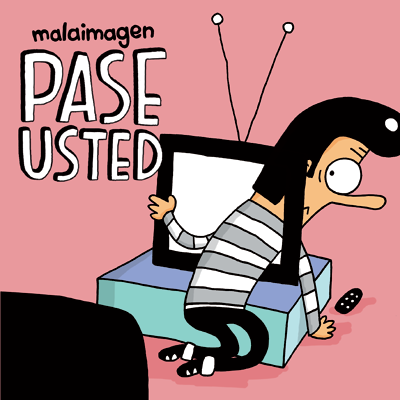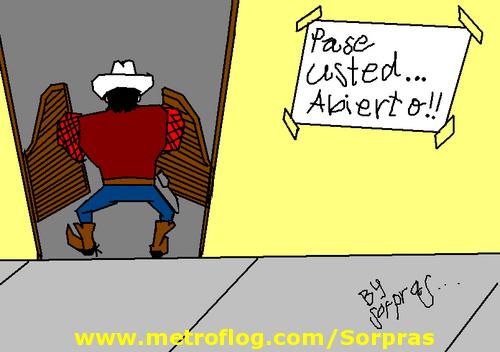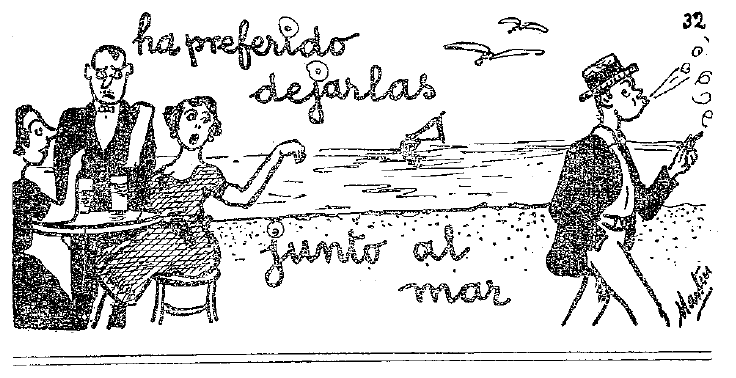
| Языки :: Испанский |
| Аудио |

 |
|
 |
|
93 |
Español |
Spanish |
|
Lección Treinta y dos (32) |
||
| Pase usted | Come in. | |
| 1 | La pensión esta instalada en el segundo piso de la casa. | The boarding-house is established on the 2nd floor of the house. |
| 2 |
Cuando llegué anoche, la criada que me abrió la puerta no comprendió mi español, y llamo a la dueña (1). |
When I arrived yesterday evening, the maid who opened the door to me did not understand my Spanish and called [at] the landlady. |
| 3 | Buenas noches, señora : deseo una habitación completa. | Good evening, Madam; I want a room with full board. |
| 4 |
Pase usted (2), señor. ¿Para usted solo? Tengo una habitación exterior que le convendrá. |
Come in, sir. For you only? I have a room looking on the street [exterior] which will suit you. |
| 5 |
La habitación era bastante grande, y con balcón; la cama parecía (3) buena. |
The room was large and with a balcony; the bed looked good. |
| 6 |
¿Qué precio tiene? - Once pesetas diarias, todo incluido : desayuno, comida y cena (4). |
What's the price of it [What p. has it]? 11 pesetas a day [daily], all included : breakfast, lunch and dinner. |
| 7 |
Tengo otra, interior, más pequeña, de nueve pesetas ¿Quiere verla? |
I have another, looking on the yard [interior], smaller, at 9 p. Will you see it ? |
| 8 |
Tomaré ésta. He dejado mis maletas al portero ¿Puedo cenar ahora? |
I shall take this one. I have left my suitcases to the doorkeeper. Can I have dinner now? |
| 9 |
Sí señor. Pase usted al comedor, por aquí. En seguida le servirán la cena. |
Yes, sir, Pass into the dining-room, this way [by here]. We [(they)] will serve you dinner presently. |
| EJERCICIOS | EXERCISE : | |
| 1 | ¿Ha llegado su primo? | Has your [his (Honour's) ] cousin arrived ? |
| 2 | Llegó ayer (pron. a-yairr) por la mañana. | He arrived yesterday morning [by the m.]. |
| 3 | ¿Cuánto tiempo se quedará en Madrid? | How long will he stay in M.? |
| 4 | Menos de una semana; ha dejado a su mujer y a su hija en Santander, |
Less than a week; he has left his wife and daughter in S., |
| 5 | y regresará con ellas. | and will return with them. |
| 6 | ¿Por qué no han venido con él? | Why have they not come with him? |
| 7 | Ha venido por sus negocios, y como hace tanto calor en Madrid, |
He has come for his business and as it is so hot [makes such heat] in M., |
| 8 | ha preferido dejarlas cerca del mar. | he has preferred to leave them near the sea-(side). |
| 9 | Tienen suerte; ¡qué calor! espero escaparme también de aquí por unos días. |
They have luck; what heat! I hope to get away [escape] from here also for a few days. |
| NOTES. | |
| 1 |
Preterite, verbs in -ar : llamar; llamé,
llamó : to call; I, he, called. |
| 2 |
Pasar, to pass, is also said for to enter ; Pase usted : come in, go in. |
| 3 |
Progressive (or frequentative) preterite : verbs in -ar
: |
| 4 |
The word desayuno (dessa-yoono) is formed like breakfast
(to break the fast). El ayuno : the fast. Desayuno is used only for breakfast. - Just as in England, the meanings of, and times for lunch, dinner and supper vary according to the regions and social classes; in Spain they say el almuerzo or la comida at midday (or rather between 1 and 3); and at night la comida or la cena. |
|
Mañana, tomorrow or
morning. |
